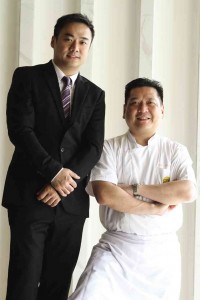Young restaurateur banks on aces up his sleeve
MANILA, Philippines—Bryan Tiu was only about 18, still in school, when he first tried his hand in business via a pizza chain franchise.
By age 25, he had already established his own brand, Teriyaki Boy, and had grown what he started as a single restaurant into a chain of 10 stores. Four years later, just when T-boy—as he fondly calls it—was peaking, Bryan sold a majority stake in it and took a long break.
After relinquishing control of Teriyaki Boy to Pancake House Inc. of the Lorenzo Group, Bryan did no hardcore business for several years, although he helped his siblings form and run the company he is now heading as president and CEO, iFoods Inc.
He traveled around, met people from outside his comfort zone and spent much time with his young family. While doing all this, he learned more about the food trade—from the dishes to be served to the market he wished to cater.
He made much use of his time learning everything about the restaurant business as he focused on his goal of going back into the mainstream.
Confident that he now has the proper tools to face the challenges of the game, Bryan is staging a comeback—and in a big way—with a lot more ideas, dreams and plans.
Casual and high-end
Hoping to make a dent both in the mainstream and the high-end segments of the restaurant business, Bryan has set his sights on not just one brand, but several, under the banner brand iFoods Inc.
One thing is clear to him, iFoods must be all about homegrown brands.
For the mainstream or casual dining segment, iFood has the following brands: Tokyo Café, Stackers Burger Café, Peri-Peri Charcoal Chicken, Kogi Bulgogi, Parmigiano and, the latest, Miso-Ramen and Tempura.
Collectively, these brands now have 23 outlets and counting.
He will soon open a Euro café-type of restaurant, Spatzel, at the newly renovated Shangri-La Mall. Of the existing casual dining outlets, 19 are company-owned and four are under franchising.
As for the high-end segment, iFoods has Wafu, a posh 800-square-meter Japanese restaurant that opened five months ago at the heart of the Greenhills Shopping complex in San Juan.
Wafu is run by Bryan with managing partner Chris Oronce, who has worked as a chef in several restaurants mostly in Las Vegas including MGM Grand Shibuya and Koi Restaurant at Planet Hollywood.
Another high-end brand, a Korean restaurant called Woo Galbi, will also open at the Shagri-La Mall.
No office job
When he was young, Bryan was a simple boy with simple dreams. His family used to be in the textile business in Divisoria. There, he spent most of his summers behind a cash register, only because he liked the sound and the feel of the old style machine.
He says his parents encouraged him to go into the family business, but he was not forced into it. Those days, his only dream was to have an air-conditioned space that he could call an office.
“That’s only because it was too hot and crowded in Divisoria, and I just want a cooler place. Also, I want to have something that people won’t call tindahan (store) as our Divisoria outlet was called then,” Bryan says.
He knew even then that he wasn’t cut out for an office job and doing business was his calling.
“But I was not too keen on the textile business. I found it too complicated,” Bryan says.
The opportunity came up when he was 18 while studying at the Philippine School of Business Administration. With his savings and some help from his parents, he got himself a franchise of a pizza chain.
The pizza business initially did well, growing from one outlet to four. But after a few years, it started losing money, which forced him to close shop.
Market niching
Despite the failure, the pizza franchising episode just affirmed his interest in entrepreneurship and the food business. Armed with the lessons learned from his first stint in business and inspired by his fondness for Japanese food, Bryan went on to put up Teriyaki Boy, a casual Japanese restaurant that would fill the gap between the fine-dining and low-end Japanese restaurants that were around then.
Carving a niche in the market turned out to be a wise move. Teriyaki Boy was an instant hit. In just four years, what started as a single restaurant on Madison Square in Greenhills expanded into a 10-store chain.
“I was just aiming for one successful restaurant,” he says.
The rapid expansion of Teriyaki Boy must have overwhelmed Bryan that he doubted his capability to sustain and manage this kind of growth, given his limited resources.
To ensure that its growth would be sustained and the Teriyaki Boy brand would thrive, Bryan decided to sell 70 percent of Teriyaki Boy to the Lorenzo group, keeping 30 percent.
Fresh ideas, great plans
The break he took after Teriyaki Boy was long, about seven years, but it did not mark a complete departure from business. This phase served as some sort of a post-graduate learning stage for Bryan. As he traveled, he talked to all sorts of people and advised friends and family on their businesses. He was, in a way, preparing himself for a comeback.
“I went back to basics. I studied the culture of the products, I worked on understanding the industry more—the food itself, the market, the materials we use, and the ways of doing the restaurant business. I learned from the many years I have been in the food and restaurant business that getting very good chefs was not enough. Research and development, which I really like, plays a very important role in ensuring the success of a venture,” he says.
In the initial years of iFoods and its restaurants—Tokyo Café, Peri-Peri and Kogi Bulgogi, Bryan was involved but he stayed in the sidelines. For many years, he was just the “coach” and the R&D guy of the family business.
Sometime last year, Bryan decided he was ready to take the plunge again and he did. He assumed the top post at iFoods with the determination to grow the business and establish quality homegrown brands of restaurants under the iFoods banner.
He immediately opened new restaurants—Wafu and Miso-Ramen and Tempura—and reimaged the existing restaurants to keep up with the times.
“A lot of foreign brands are coming in, we have to be ready,” he says.
The concepts for iFoods’ mainstream restaurants were inspired by ideas he picked up from the various places he visited.
“Peri-peri (named after an African spice called piri piri) is like Nando’s, a South African casual dining restaurant that is present in about 30 countries. Tokyo Café is like a typical Japanese coffee shop overseas,” he says.
The others are restaurant concepts that he believes will click with the Filipino market. Each follows a certain theme, from the food to the restaurant’s setup.
Stackers Burger Cafe, for instance, is a burger and chicken place with an extensive line of specialty coffee drinks. The beef burgers are grilled in special signature sauces. Stackers takes pride in its baked fried chicken that promises to be a healthier alternative to other fried chicken brands as it uses 80 percent less oil. The restaurant provides a hip and colorful atmosphere that appeals to the A and B markets across all ages.
Peri-Peri Chicken offers African-Portuguese style grilled chicken cooked on spit-fire grill. It started as a quick service outlet that eventually evolved into a casual restaurant.
Kogi Bulgogi offers diners a taste and ambiance of Korea. Its food, with Bulgogi as the best seller, and the restaurant’s interiors—earth tones contrasted with dark furniture, adorned with bamboo trees and smooth pebbles—provide a unique Asian feel.
Named after a delicious cheese, Parmigiano Ristorante Pizzeria serves Italian cuisine and specializes on Napoletana pizza. Personally trained in the art of pizza making in Italy, Bryan shares his training with skilled chefs in preparing this dish.
Tokyo Café, a Japanese coffee shop concept, planted its roots in the biggest establishment in the country, the SM Mall of Asia. It offers a fusion of Euro-Japanese casual cuisine and provides well-lit interiors and an ambiance of modern Japanese elements.
Bryan says Tokyo Café is also a coffee shop where people, especially the younger group of yuppies and startup entrepreneurs, can meet for business or fun.
Still showing Bryan’s extra fondness for Japanese food, iFoods recently opened Miso-Ramen and Tempura which, as its name implies, specialized in ramen and tempura.
Spatzle, which is opening soon, will be a Euro café type of restaurant.
His flagship in the high-end segment, Wafu, is a modern Japanese restaurant that is more of a destination place where one can best celebrate special occasions or have a quiet fine-dining experience. Pricing is on the high side, but those who have tried it say it was worth it.
For Wafu, Bryan says, the biggest challenge now is to continue reinventing itself to maintain the interest of the particular segment of the market it is catering to. Having started only about five months ago, Bryan is thinking of a concept that involves the introduction of monthly specials that, he hopes, will entice people to keep coming back to Wafu.
All homegrown
Although all the iFoods brands are homegrown, Bryan says they give one’s palate a taste of different cuisine from around the world.
Bryan admits being approached by foreign brands for possible franchising arrangements, but he says he is sticking with homegrown brands.
“Those restaurants we see and go to when we travel overseas maybe good, but we can do what they do, or even better. We don’t need to franchise foreign brands, we have a lot of talented Filipinos here, and there are many Flipinos who have worked for many years overseas, especially in the food and service business, who are coming back,” he says.
This year, Bryan is prepped up for an aggressive expansion. Aside from the two new brands iFoods is introducing soon, the company aims to open 10 casual dining outlets this year while it renovates and modernizes the existing restaurants.
With the economy growing, Bryan is now more upbeat on the restaurant business.
“People are dining out more, and they are getting more adventurous in the food they eat and the restaurants they go to.”
He says iFoods will become more aggressive when it comes to franchising, particularly in the provinces, to support expansion. But with the lesson learned from his pizza franchising days, he vows to take really good care of iFoods’ franchisees.
New dream
Bryan is an entrepreneur, and he admits he is not an expert in food itself. That’s why in every restaurant venture he goes into, he has experts who have been making his ideas and plans possible.
They are what he calls the “aces up his sleeve.”
In Teriyaki Boy, he had Chef Noli, then a retired chef of a popular Japanese restaurant in Manila who just responded to his ad. Chef Noli is still with him, helping him now in the Miso-Ramen and Tempura.
For Wafu, there is Chef Chris, who takes care not only of the kitchen and food, but also the management of the restaurant.
“It’s his show. Wafu is chef-driven. I just provided him with a good restaurant and I continuously pressure him to come out with great food,” Bryan says.
For the entire iFoods operations, he counts on his siblings to take care of finance, accounting and other backroom concerns.
As his dreams level up, the job gets very demanding. Bryan gets swamped with work of various concerns. He is, however, confident that in the future, he will be free of some concerns that may not necessarily need his personal attention and he will be able to focus on the things that he is so passionate about—marketing and research and development.
“I just want to be just a chief creative officer someday,” says the iFoods CEO.
















